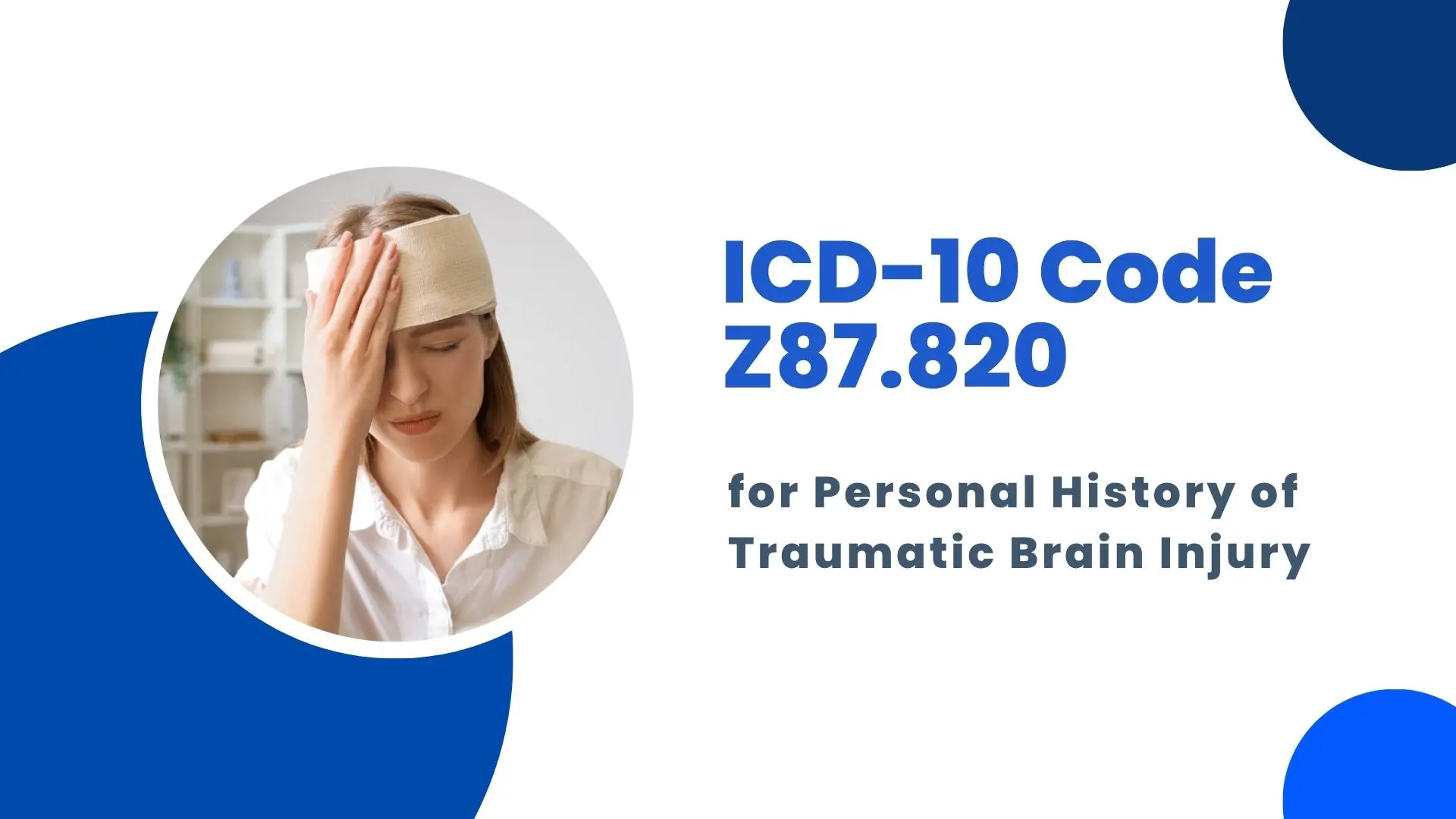Many people suffer from traumatic brain injury every year. Some individuals return to baseline functioning, whereas others experience lasting effects. For patients where a prior TBI matters for care of today, the Z87.820 (ICD-10 code for personal history of traumatic brain injury) is used to capture that history.
In this article, we’ll describe the how, when, what, and why of reporting Z87. 820. It also reviews other related codes, such as the ICD-10 code for head trauma and traumatic subdural hematoma ICD-10, to avoid regular mistakes for the correct payment of all services provided.
Explaining ICD-10 code Z87.820
Z87.820 means a personal history of traumatic brain injury. It captures the history of an individual about when he had a brain injury, but that injury is still affecting his mental health. This code doesn’t show that the injury is still active; rather, it shows that it still matters.
This is common during retroactive payment adjustments involving prior TBI, whether it is a concussion, closed head injury, or traumatic subdural hematoma ICD-10.
When to Use Z87.820
Utilize Z87.820 only if the brain injury sustained is no longer receiving treatment. In this case, the history should be relevant to the visit on record.
You might use it if:
· A patient is suffering from chronic headaches, memory loss, or both, and has a total brain injury ICD-10 in the history.
· They are undergoing treatment for post-head trauma ICD-10 mood disorders.
· You are assessing post-traumatic brain injury ICD-10 seizures.
If relevant, you may also add, ICD-10 code history of stroke, personal history of stroke ICD-10, or ICD-10 history of CVA if the patient has a stroke history. Those codes will only be appropriate if they apply to the visit.
How to Use Z87.820 Correctly
Do not mix active problems with history. Use current condition codes if the TBI is still being managed.
These apply to active TBI:
· S06.9X9A – for unspecified intracranial injury.
· S06.5X0A – for a current traumatic subdural hematoma.
· S09.90XA – for closed head injury.
You can use Z87.820 when:
The injury is no longer present
· A past injury that has links to the current symptom is present
· The provider documentation states that it is a relevant history for care or risk assessment
This code can also pair with others, like:
ICD-10 for TBI-related seizures
ICD 10 history of CVA, if there’s a stroke in the past too
Billing Tips for Z87.820
Here’s a quick do/don’t list to help you code it right:
| Do | Don’t |
| Use with resolved TBIs that still affect health | Use it for current brain injuries |
| Document why the TBI history matters today | Skip the note and hope for the best |
| Pair with codes like ICD-10 code for history of stroke if needed | Use it instead of active TBI codes like the TBI ICD-10 code |
Always back it up with a good note. Without proof in the documentation, your claim might get denied.
Clinical Scenarios: When to Use Z87.820
Let’s look at how Z87.820 works with other ICD-10 codes in real-world visits:
| Scenario | Main Code | History Code(s) |
| Memory trouble after old TBI | G31.84 | Z87.820 |
| Depression linked to prior TBI ICD-10. | F33.9 | Z87.820 |
| Routine checkup for someone with stroke and TBI history | Z00.00 | Z87.820 + Z86.73 |
| Seizures following old brain injury | G40.909 | Z87.820 |
| Follow-up after surgery from prior ICD-10 for TBI | Z09 | Z87.820 |
Documentation checklist
Before billing for Z87.820, ensure your chart notifies:
· Dates of the prior injury.
· Current symptoms relevant to the injury.
· Explanation of the significance of the history.
· Its impact on the care plan.
Insurance may deny your claim if these details are not provided.
Final Thoughts
The effects of a former TBI are long-standing. They might involve seizures, changes in thinking, or a higher risk of falls. A patient’s history is relevant and important. The patient’s narrative history can and should be captured with ICD-10 code Z87.820. This also ensures billing is accurate.
The same principle applies when patients have other neurologic problems. These include ICD-10 history of stroke, head trauma, and past traumatic subdural hematoma.
Providers Care Billing LLC is dedicated to helping you make these connections. We are familiar with crucial history codes and modifiers. We know well how to accurately utilize the ICD-10 code for traumatic brain injury with the modifiers and supporting documentation in an accurate and timely manner.
FAQ’s
Q1: Differentiate the Z87.820 and ICD-10 code for history of stroke?
A: Z87.820 is not for strokes; it only includes a history of brain injury. If the patient had a stroke before, you’d usually go with something like Z86.73 or an ICD-10 code for history of CVA. But yeah, if the person had both a stroke and a TBI, and it’s relevant to today’s visit, you can bill both codes. Just make sure the notes support it.
Q2: Is it permissible to bill Z87.820 in combination with the seizure codes?
A: Yep, that is perfectly fine to do. If the patient has seizures because of a past TBI, then Z87.820 can be used with G40.909 (unspecified epilepsy). If it’s simply a history of seizures, and the patient doesn’t have them anymore, you could add ICD-10 for history of seizures too. Just remember to show the linkage between the codes in the documentation, in a very straightforward manner.
Q3: Is the ICD-10 code for history of subdural hematoma the same as Z87.820?
A: Not precisely, but a bit. There is no subcode for history of subdural hematoma; thus, Z87.820 works when it is due to a traumatic cause. If the subdural was due to TBI, then you are fine. Just make sure that you document, particularly if it is not being treated anymore.
Q4: Can I use Z87.820 with mental or cognitive issues like F07.81?
A: That happens a lot. If your patient has stuff like memory loss, confusion, mood swings, and it’s from an old brain injury, pairing Z87.820 with F07.81 (Postconcussional syndrome) makes total sense. G31.84 might work too for milder cognitive stuff. Just be clear that it’s because of the TBI.
Q5: What if the patient had a fall and hit their head years ago?
A: If that fall caused a TBI and it’s still affecting them in any way, yes, go ahead and use Z87.820. You might also use something like ICD-10 code for fall with head strike or hx of fall ICD-10, depending on how much detail matters in this visit. Just don’t code the fall as current if it’s years old; use history codes.
In some cases, patients with a history of TBI may also report symptoms like chest pain, making it important to understand related codes such as R07.89 and R07.9 for chest pain symptoms.





